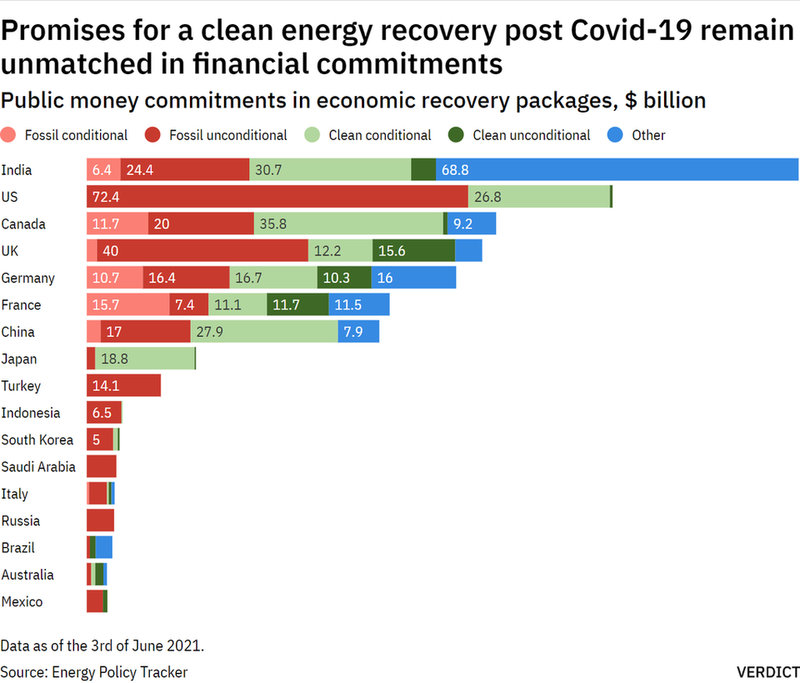Data
Clean recovery pledges unmatched by financial commitments
Powered by
The Covid-19 recovery may not be as clean as early government pledges indicated, with funding so far leaning towards fossil fuels in many parts of the world.
Pledges made by governments around the world for a clean recovery post-Covid-19 remain unmatched by financial commitments, according to data collected by Energy Policy Tracker.
Analysis of public spending on economic recovery packages shows that measures taken by many governments do not add up to the clean energy revolution many had hoped for, as funding for fossil fuels still outweighs funding for clean energy sources.

Since early 2020, governments in G20 countries have committed at least $649.20bn to supporting different energy types through new or amended policies, according to official government sources and other publicly available information analysed by Energy Policy Tracker.
At least $295.16bn of these funding commitments are in support of fossil fuel energy, while at least $230.66bn are in support of clean energy.
Across major European countries, spending is largely in favour of clean energy, according to EnergyMonitor’s analysis of Covid-19 recovery policies announced so far.
In Europe, Germany is the leader in clean energy policies, pledging a total of $42.4bn (as of February 2021) towards sustainable recovery. Measures include a $12.6bn fund designed to lower the cost of the renewables surcharge placed on German domestic energy bills, and a $10.2bn bailout of Germany’s flag carrier Lufthansa, which falls into the fossil fuels category.
In the UK, the majority of funding lies in fossil fuel policies. As EnergyMonitor points out, this is largely due to a $35.1bn road-building programme, which is considered a fossil fuel policy as new roads will largely cater to petrol and diesel cars in the near future. Clean recovery packages in the UK include $4.1bn for the construction of energy-efficient homes and $3.6bn for electric vehicle infrastructure.
Outside of Europe, Covid-19 recovery funding leans towards fossil fuels. Japan, Canada, India, Brazil, Australia, South Korea and Russia are directing a total of $64.6bn towards fossil fuels, compared with $47.3bn being spent on clean energy.
In the US, fossil fuels massively outweigh clean energy in recovery funding announced so far. This could change, however, if all elements of President Biden’s proposed $2tn ‘Build Back Better’ plan come into force. It would see hundreds of billions of dollars going towards funding of national infrastructure, including low-carbon transport systems and clean energy generation.
Methodology
Energy Policy Tracker classes policies as ‘fossil unconditional’ if they support production and consumption of fossil fuels (oil, gas, coal, ‘grey’ hydrogen or fossil fuel-based electricity) without any climate targets or additional pollution reduction requirements, and ‘fossil conditional’ if climate targets or additional pollution reduction requirements are included in the policy.
Policies are considered ‘clean unconditional’ if they support production or consumption of energy that is low-carbon and has negligible impacts on the environment, such as solar, wind, small hydropower, tidal, geothermal and ‘green’ hydrogen.
Policies are considered ‘clean conditional’ if they are stated to support the transition away from fossil fuels, but unspecific about the implementation of appropriate environmental safeguards.
‘Other energy’ is an umbrella category for policies outside of the ‘fossil’ and ‘clean’ categories and includes nuclear energy (including uranium mining), first-generation biofuels, biomass and biogas (with proven negative impact on the environment), incineration, hydrogen of unspecified origin, and multiple energy types such as intertwined fossil fuels and clean energy (a sizeable group, since many policies benefit both fossil and clean energy across the board).
https://datawrapper.dwcdn.net/Io1KO/4/